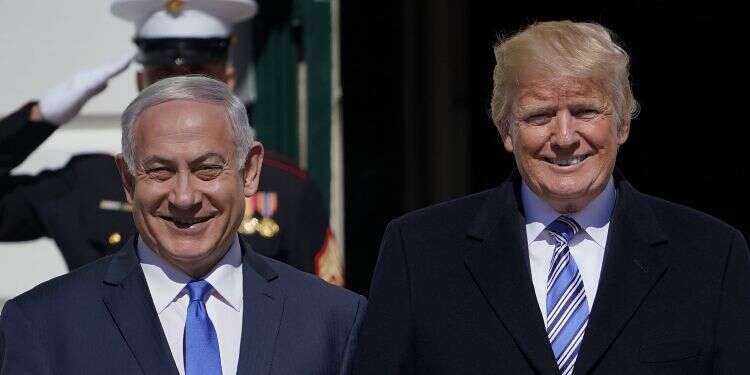Israeli Prime Minister Benjamin Netanyahu appeared resigned on Thursday to a possible meeting between US President Donald Trump and Iranian President Hassan Rouhani, after voicing opposition to world powers opening a dialogue with Iran.
The Israeli leader, who earlier in the day asserted that this was not the time to hold talks with Iran, said he recognized the possibility of a Trump-Rouhani meeting, and that it was not up to him to tell Trump with whom he could meet.
Follow Israel Hayom on Facebook and Twitter
"I'm sure Trump will take a much tougher position," Netanyahu told reporters traveling with him to London, an official in the prime minister's office later said.
This was more restrained than a statement he made earlier in the day when he was to meet with British Prime Minister Boris Johnson: "This is not the time to hold talks with Iran. This is the time to increase the pressure on Iran."
On Wednesday, Trump left the door open to a possible meeting with Iranian President Hassan Rouhani at the upcoming UN General Assembly in New York, saying: "Anything's possible. They would like to be able to solve their problems."
Netanyahu later met US Defense Secretary Mark Esper.
Tehran has rejected any negotiations with Washington unless Trump drops sanctions that he imposed after quitting the 2015 Iranian nuclear deal, an agreement Netanyahu had savaged as inadequate.
Iran has said that starting on Friday, it would begin developing centrifuges to speed up the enrichment of uranium, which can produce fuel for power plants or for atomic bombs. The Iranians deny seeking nuclear weapons.
The centrifuge move would be Iran's latest reduction of its commitments to restrict nuclear projects under the 2015 deal.
Netanyahu called this "another violation, another provocation by Iran, this time in the realm of its quest for nuclear weaponry."
Meeting Johnson at 10 Downing Street, Netanyahu praised the politically embattled British leader for his "staunch stance against anti-Semitism and ... support for Israel's security."




